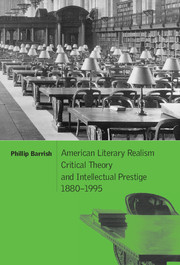Book contents
- Frontmatter
- Contents
- Acknowledgements
- Introduction
- Chapter 1 William Dean Howells and the roots of realist taste
- Chapter 2 The “facts of physical suffering,” the literary intellectual, and The Wings of the Dove
- Chapter 3 The “genuine article”: credit and ethnicity in The Rise of David Levinsky
- Chapter 4 What Nona knows
- Chapter 5 From reality, to materiality, to the real (and back again): the dynamics of distinction on the recent critical scene
- Notes
- Bibliography
- Index
Chapter 4 - What Nona knows
Published online by Cambridge University Press: 22 September 2009
- Frontmatter
- Contents
- Acknowledgements
- Introduction
- Chapter 1 William Dean Howells and the roots of realist taste
- Chapter 2 The “facts of physical suffering,” the literary intellectual, and The Wings of the Dove
- Chapter 3 The “genuine article”: credit and ethnicity in The Rise of David Levinsky
- Chapter 4 What Nona knows
- Chapter 5 From reality, to materiality, to the real (and back again): the dynamics of distinction on the recent critical scene
- Notes
- Bibliography
- Index
Summary
Some lived in it and never felt it but he knew it all was nada y pues nada y nada y pues nada. Our nada who art in nada nada be thy name thy kingdom nada thy will be nada in nada as it is in nada.
Ernest Hemingway, “A Clean,Well-Lighted Place”“Oh, but I mean a convent where nobody believes in anything.”
Nona, in Edith Wharton's Twilight Sleep“You are all a lost generation.”
Gertrude Stein, as cited by Ernest HemingwayEdith Wharton's scandalized disapproval of the flapper makes for part of a widely held notion that she disdained modernist cultural forms, whether they were instantiated in twenties jazz culture or in the literary modernism that rose to prominence during the post-War portion of her own career. Wharton was indeed harsh both towards what she saw as the self-indulgent narcissism of the “new” New Woman and towards the “turgid welter of pornography” that, in her view, comprised much of the literature celebrated by the “youngs.” The overlap in her views of modern women and of modernist literature is shown by her response when asked in 1928 whether she had yet read Virginia Woolf's Orlando. No, Wharton said. The photographs of Woolf in publicity for the book “made me quite ill. I can't believe that where there is exhibitionism of that order there can be any real creative gift.”
- Type
- Chapter
- Information
- Publisher: Cambridge University PressPrint publication year: 2001



